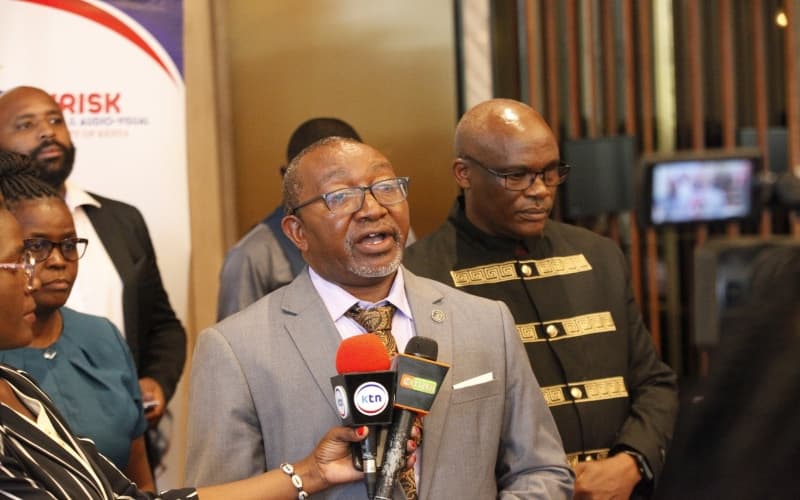We're loading the full news article for you. This includes the article content, images, author information, and related articles.
The Performing and Audio-Visual Rights Society of Kenya (PAVRISK) has garnered significant endorsement from creators, solidifying its position as the primary body for collecting and distributing royalties in Kenya.

Kenyan creators have largely endorsed the Performing and Audio-Visual Rights Society of Kenya (PAVRISK) as the country's trusted royalties collector. This endorsement comes amidst ongoing efforts by the Kenya Copyright Board (KECOBO) to consolidate and enhance transparency in the collection and distribution of royalties to artists and rights holders. Analysts suggest this move could significantly influence public debate and policy execution in the near term, with stakeholders calling for greater clarity on implementation timelines, associated costs, and protective safeguards for creators.
PAVRISK's role as a multi-rights Collective Management Organisation (CMO) has been reinforced by KECOBO, which has granted it a license to collect and distribute royalties for musicians and audio-visual rights holders. This decision by KECOBO to license PAVRISK as the sole multi-rights CMO for certain categories of works has been a focal point of discussions and legal proceedings within the creative industry.
The landscape of royalty collection in Kenya has historically been marked by challenges, including wrangles, lack of transparency, and accountability among various CMOs. Previously, several organizations, including the Music Copyright Society of Kenya (MCSK), the Kenya Association of Music Producers (KAMP), and the Performers Rights Society of Kenya (PRISK), operated in the space.
KECOBO, mandated by the Copyright Act of Kenya, 2001, is responsible for licensing and supervising CMOs. The Board's decision to move towards a single multi-rights CMO for certain categories was driven by a desire to address these long-standing inefficiencies and restore trust in the royalty management system.
In June 2024, KECOBO ordered the immediate closure of accounts used by MCSK, KAMP, and PRISK for royalty collection, following its decision to hand over this responsibility to PAVRISK. This move was challenged by KAMP, leading to a Copyright Tribunal ruling that directed KECOBO to reconsider applications from KAMP, PAVRISK, and MCSK. Following a review, KECOBO re-issued the license to PAVRISK in August 2024, in compliance with the tribunal's directive.
PAVRISK's current license, which was provisionally granted for six months in May 2025, allows it to represent a broad spectrum of rights holders, including authors, composers, arrangers, and performers of sound recordings, as well as audio-visual rights holders such as scriptwriters, actors, and actresses. Joseph K. Njagih, PAVRISK's Chief Executive Officer, stated that this expanded mandate solidifies the organization's legal standing as a compliant CMO.
The Copyright Act 2001, Section 46 (12), explicitly states that it is illegal for any individual, society, or group to collect royalties without a valid license from KECOBO. This legal framework underpins PAVRISK's operations and its efforts to enforce royalty payments from commercial users of music and audio-visual works.
PAVRISK has actively sought partnerships to streamline royalty collection. In July 2025, it partnered with the Pubs, Entertainment, and Restaurants Association of Kenya (PERAK) to ensure fair payments to artists and protect business owners from harassment. Edwardo Waigwa Kimani, the chairperson of PAVRISK, emphasized the commitment to ensuring artists are paid fairly and transparently.
In September 2025, PAVRISK disbursed KSh 24 million to 5,887 artists as its inaugural general royalty distribution, representing 70 percent of the KSh 45 million collected in the 2024/2025 financial year. This payout aligns with the mandatory 70-30 royalty sharing rule, where 70% goes to rights holders and 30% covers administrative costs. KAMP and Related Copyright received KSh 6.9 million from PAVRISK to distribute to sound recording producers under an operational consent agreement.
The consolidation of royalty collection under a single entity like PAVRISK, while aiming for efficiency and transparency, also carries implications for the diverse interests within the creative industry. The transition has been met with legal challenges from other CMOs, highlighting the complexities of managing various rights.
Ensuring that all categories of creators, from musicians to scriptwriters and actors, are adequately represented and compensated remains a critical aspect of PAVRISK's mandate. The organization's commitment to refining distribution algorithms and expanding monitoring coverage will be crucial for maintaining trust and ensuring equitable payouts.
Despite the recent progress, uncertainties persist regarding the long-term stability of the consolidated royalty collection system and how it will fully address historical grievances of artists concerning transparency and timely payments. The ongoing legal battles and the need for continuous stakeholder engagement underscore the dynamic nature of this sector. The specific timelines for full implementation of new policies and the resolution of all outstanding legal disputes remain areas of keen interest.
Stakeholders will be closely watching PAVRISK's continued efforts to refine its distribution mechanisms, expand its monitoring capabilities, and ensure timely and transparent payouts to artists. The resolution of any remaining legal challenges and the effectiveness of partnerships with user associations like PERAK will be key indicators of the new system's success. Furthermore, the public participation process for the draft consolidated music and audio-visual tariffs for 2025-2028, announced in September 2025, will be important for shaping future royalty structures.
Keep the conversation in one place—threads here stay linked to the story and in the forums.
Sign in to start a discussion
Start a conversation about this story and keep it linked here.
Other hot threads
E-sports and Gaming Community in Kenya
Active 9 months ago
The Role of Technology in Modern Agriculture (AgriTech)
Active 9 months ago
Popular Recreational Activities Across Counties
Active 9 months ago
Investing in Youth Sports Development Programs
Active 9 months ago